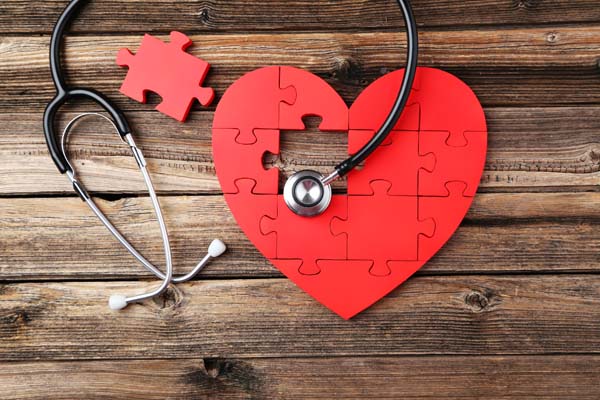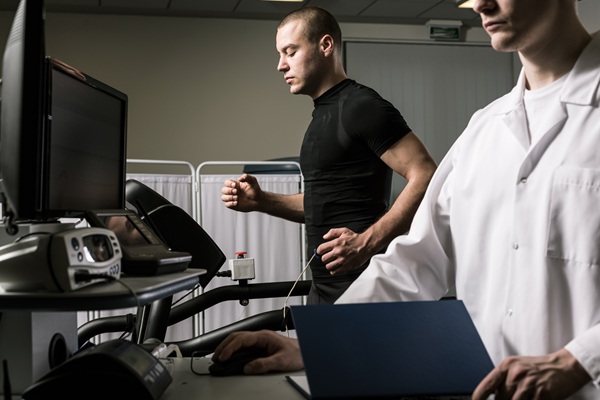A Cardiologist Explains What a Heart Monitor is Used For

If at a recent appointment your cardiologist recommended that you wear a heart monitor, you may be nervous. It is likely you are wondering what to expect when wearing this monitor and what conditions or irregularities it can detect.
Your doctor may recommend that you wear a monitor if you have been experiencing symptoms such as chest pain, shortness of breath or racing heartbeat, or simply if you are taking a new medication that could affect your heart. Heart monitors are often used to detect abnormalities such as arrhythmias, and the readings can be used as a diagnostic tool for addressing the root of a problem. Knowing that you have to wear a monitor might be a scary thought, but when you know what the monitor is used for, you can feel more at ease.
Situations that may require monitoring
Irregular heartbeat
Sometimes an irregular heartbeat is not indicative of a major problem. However, if the irregular heartbeat is accompanied by shortness of breath or has affected physical activity, a cardiologist may want to monitor the heartbeat to see if there is an underlying problem. Simple arrhythmias may not need special treatment, or the doctor may be able to control the irregularity with medication. If the irregular heartbeat is becoming more frequent or is accompanied by an uncomfortable, crushing sensation in your chest, it is time to talk to a cardiologist about the best monitor for the particular situation.
New heart medications
Medications to treat heart conditions may need to be closely monitored by a physician when first prescribed. The doctor may want to monitor the effectiveness of the medication or check for any adverse side effects. With a monitor tracking heart activity, it is easier to gauge if the current treatment is effective for the condition it is trying to address.
Chest pain
Chest pain is a serious condition that needs to be addressed by a medical professional as soon as possible. However, after ruling out conditions such as a heart attack, a cardiologist may want the patient to wear a monitor that can be pressed when chest pain begins. This can help pinpoint any abnormal episodes the heart may have and provide the doctor with powerful insight into any concerning conditions. The patient must remember to press the monitor whenever symptoms begin so as to provide an accurate representation of the episode’s severity and duration.
Conclusion
Talking with your cardiologist about concerns you may have about your heart is a great place to start when deciding if a heart monitor is necessary for you. These monitors can track your heart’s activity throughout your daily activities, unlike a one-time test in a doctor’s office, giving your cardiologist a valuable glimpse into the overall condition of your heart. Speak up at your next appointment to let your doctor know what your symptoms are. Do not continue to ignore any symptoms that you have that may need monitoring; contact your cardiologist today to learn more about your heart health.
Request an appointment here: https://boyntonbeach.floridapremiercardio.com or call Florida Premier Cardiology at (561) 229-1411 for an appointment in our Boynton Beach office.
Check out what others are saying about our services on Yelp: Read our Yelp reviews.
Recent Posts
According to the Centers for Disease Control and Prevention, heart disease is the leading cause of death for adults in the United States. Therefore seeking chest pain treatment is crucial, especially for those at high risk for heart disease. However, chest pain can result from various health issues, so how does one know when it…
A cardiac stress test is a diagnostic tool to evaluate how well the heart performs under physical stress. Cardiologists use this test to detect underlying cardiovascular conditions, monitor treatment progress, or assess the risk of future heart complications. Cardiac stress tests are essential in the early detection and management of heart disease.A cardiac stress test…
Peripheral arterial disease affects blood flow in the arteries, most commonly in the legs. It develops due to plaque buildup in the arteries that causes them to narrow and restrict circulation, possibly leading to discomfort, difficulty walking, and other serious complications. Recognizing the symptoms early and exploring treatment options can help improve the quality of…
Receiving cardiovascular treatment is a critical step in managing heart health, but recovery and long-term are equally vital to ensure long-term wellness. Whether the treatment involves medication management, interventional procedures, or surgery, maintaining a relationship with the cardiologist and following their recovery guidelines is crucial. A structured follow-up plan allows patients to maintain the benefits…


